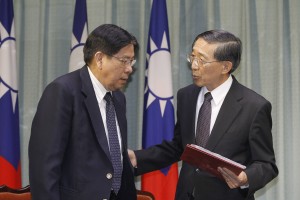
Taiwan’s Minister of Foreign Affairs David Lin, right, talks with Philippine trade office representative in Taiwan Antonio Basilio after his return from the Philippines with the government’s apology for the killing of a Taiwanese fisherman last week by a member of the Philippine Coast Guard during an early morning press conference in Taipei on May 15, 2013. Taiwan’s representative to Manila said Monday, May 20, 2013, that the contents of the Philippine apology for the killing of the fisherman were changed several times, showing the “insincerity of the Philippine government.” AP PHOTO/WALLY SANTANA
MANILA, Philippines—The contents of the Philippine apology for the killing of a Taiwanese fisherman by Filipino Coast Guards were changed several times, showing the “insincerity of the Philippine government,” Taiwan’s representative to Manila said Monday.
David Chien, political affairs officer of the Taiwan Economic and Cultural Office (Teco), told reporters that the letter of apology was signed by Manila Economic and Cultural Office (Meco) Chairman Amadeo Perez Jr. and resident representative Antonio Basilio.
Chien said that since May 9, after the killing of fisherman Hung Shih-chen, both governments had been closely working together to try to find a solution to the problem caused by the incident.
He said that on May 14, Meco and Teco reached an agreement on measures to take to avoid an escalation of tensions.
“The agreement included a formal letter expressing the Philippines’ response to the Taiwan government’s requests, to be delivered by Basilio to the Ministry of Foreign Affairs (Mofa),” Chien said.
Completely different
“However, when Mr. Basilio arrived in Taiwan on the evening of May 14, he presented a letter to Mofa that was completely different from the one initially agreed upon by Meco and Teco,” he said.
The first version, he said, contained the words “Philippine government,” but the second version omitted it.
On the matter of investigation, the first version and third version mentioned that an investigation by the National Bureau of Investigation would start soon, but the final version mentioned no such investigation, he said.
On the compensation for the family of Hung, the first and third versions stated financial restitution, but the final version says “donations received from the commiserating Philippine people” and did not mention restitution to the victim’s family, Chien said.
On Taiwan’s demand for fishery talks, all four versions of the letter differed, he said.
“The Philippines’ Department of Foreign Affairs and other government agencies apparently have insisted on certain wordings for the letter,” he said.
“The final version of the letter was still very different from the first letter agreed upon in the afternoon of May 14,” he said.
“Taiwan felt that this inconsistency shows the insincerity of the Philippine government in meeting the Taiwan government’s demands,” he added.
Taiwan consistent
Chien added that the Taiwanese government had been consistent with its requests.
“We want a formal apology from the Philippine government, an impartial and thorough investigation, appropriate punishment for perpetrators, compensation to the family of the victim from the Philippine government, and the conduct of fishery talks between Taiwan and the Philippines as soon as possible in order to establish fishery orders in overlapping EEZs (exclusive economic zones),” he said.
Chien maintained that Hung’s boat was in Taiwanese waters when it was fired upon by Philippine Coast Guards.
He said economic sanctions would continue until the Philippine government responded to Taiwan’s “requests.”